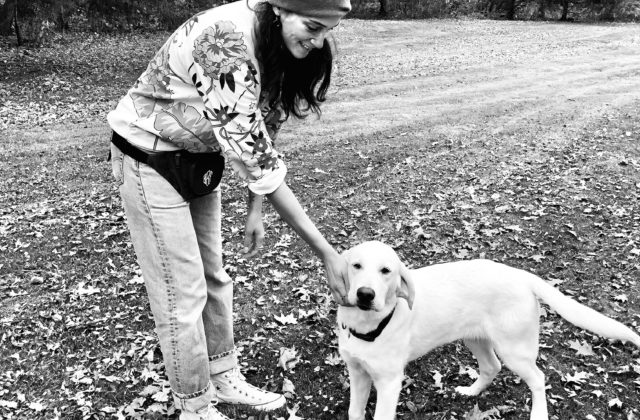From Puppy to Assistance Dog
ECAD provides animals and training that help change lives
Text and Photo by Jude Mead
Some people are great at seeing a situation and assessing ways to solve it. Lu and Dale Picard are two such people. In 1995, the couple founded ECAD, the East Coast Assistance Dogs facility. According to Ms. Picard, ECAD was “born out of drive, passion and need” to help people with disabilities become more independent. The idea sprang from her experience watching her father recover from a stroke. Picard noticed his dependence and frustration and wanted to help him regain his independence. She trained the family dog to retrieve items for him. She also taught her dog to pull her father up from his chair with a simple tug on his lead so they could walk together. Her father’s attitude improved and the idea for ECAD was born. Having a background in business and administration, Piccard understood the hard work and tireless research involved and was ready for the challenge.
Her husband also saw the possibilities of establishing a place to train assistance dogs and was eager to help his wife. He used his skills and talents to convert their home into kennels and office space to start the business. ECAD became a labor of love and expanded into a center that places many assistance dogs in over a dozen states.
Today, ECAD’s whole operation is on Newfield Road in Winchester Center, Conn. “We built a 9,000 square foot building dedicated as living space with four bedrooms. That will sleep seven clients for their 13 days of training,” said Picard, “and we are presently working on acquiring permits for a new canine residence/office building.” According to Picard, the building will house forty dogs plus offices. They hope to break ground in the spring or as soon as they can find a donor to help with the project.
The assistance dogs provide many services and are highly trained to help their owners handle many life tasks. They are considered working animals and can assist with emotional support, mobility challenges, and other physical disabilities. They help in many ways. “Our dogs can wake people up from night terrors or help people who have diabetes by warning them if their blood sugar level is too high or too low,” said Picard.
In order to do their jobs, the assistance dogs most learn and follow commands. Some are basic such as sit, stay and down, but the majority are more complicated such as retrieve, lead, pull, provide balance, as well as ways of alerting their owners in certain situations. It takes a very special dog to become a service dog, so ECAD started its own breeding program. “We breed for calmness, smarts, and willingness to breed. We use Labrador Retrievers and Golden Retrievers. Our breeding program is now twenty years old,” says Picard. Because Picard also wants dogs willing to work calmly, he sometimes mixes breeds to achieve that goal.
The dogs start their training as newborns. “Our puppies start training at birth. When they are old enough, the pups will stay weekends with volunteers. By the time they are eight weeks old, their whole day is structured for training. They remain in training for 18 to 24 months before they are ready for placement. Training a service dog is like spoon feeding a baby, you can’t rush it,” says Picard.
There are specific requirements before a person is ready to be paired with a service dog. “First, a person has to go on the website and fill out an application. We will also need a prescription from their physician and three reference letters. Once accepted into the program, $25,000 will need to be raised to help with the expensive training costs. Then there are thirteen days of training in residence which will start in the training room and later move to malls, restaurants and other daily routines,” says Picard.
Volunteers are an important part of ECAD. Many volunteers get involved in the Home For the Weekend Program. The Picards believe that a safe and loving home for the dogs on weekends and holidays is a great way for puppies to socialize, have continuous training, and become confident service dogs. Norfolk resident Hilary VanWright has been taking a puppy home for weekends for about a year. She picks the dog up on Friday and drops the dog off on Sunday. “ It’s a wonderful opportunity to help. I had to attend training classes myself because it is important the dogs follow the same rules and training methods as ECAD does,” said VanWright.
The impact of ECAD has been tremendous in touching many lives, as Lu and Dale Picard continue to focus their efforts on helping people. They understand the positive changes ECAD brings to individuals and families and know their service dogs will give and receive love from people they help. They have a mission – to educate and place service dogs with people with disabilities so they can lead lives of independence and mobility. To reach out to ECAD, you can visit their website at ecad1.org.

